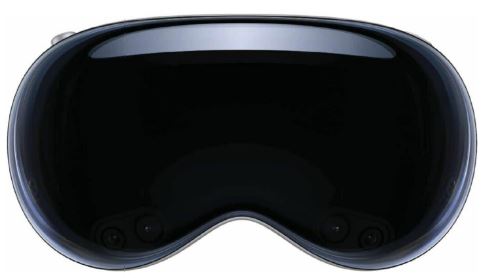
Apple isn’t exactly known for being the pioneer of new technology. Whether it’s smartphones, music players or computers, Apple is rarely first out of the gate.
Instead, it waits. A few years go by, technology advances and after its competitors have released a few versions of their devices, Apple swoops in with its first iteration of the technology – one that’s refined, powerful, stylish and always extremely expensive.
Years on from the initial boom of virtual reality, Apple has finally played its card, unveiling its first virtual reality headset. It might be late to the party, but Apple has made its usual move, with its first ever step into virtual reality being the best model we’ve seen yet.
But what’s so good about Apple’s first venture into the world of the virtual? We spoke to David Reid, professor of AI and spatial computing at Liverpool Hope University to find out.
BLENDING REALITIES
Unlike some previous attempts at virtual reality headsets, Apple’s Vision Pro device uses a mixed-reality format. This means that, instead of blacking out the world around you, the headset mixes the virtual world with the real one.
Put the headset on and you could interact with a virtual floating monitor above your desk, play games in your living room or essentially make the real world that little bit more fun.
“The big selling point here is that Apple is trying to expand what we mean by the metaverse. Where Meta is based in virtual reality, Apple is looking at augmented reality, putting these virtual elements into the world around you,” says Reid.
Bu hikaye BBC Science Focus dergisinin July 2023 sayısından alınmıştır.
Start your 7-day Magzter GOLD free trial to access thousands of curated premium stories, and 9,000+ magazines and newspapers.
Already a subscriber ? Giriş Yap
Bu hikaye BBC Science Focus dergisinin July 2023 sayısından alınmıştır.
Start your 7-day Magzter GOLD free trial to access thousands of curated premium stories, and 9,000+ magazines and newspapers.
Already a subscriber? Giriş Yap

COULD MARINE CLOUD BRIGHTENING HELP US FIGHT CLIMATE CHANGE?
The theory behind marine cloud brightening is that brighter or whiter clouds reflect more sunlight back into space.

IS IT SAFE TO RUN EVERY DAY, OR SHOULD I DITCH MY RUN STREAK TO SAVE MY KNEES?
A running streak, where you run every day without taking rest days, can be highly motivating and beneficial for overall fitness. Running is great cardiovascular exercise and isn't to be discouraged (and finding a routine with some consistency is great). Getting a bit of exercise as often as possible is also hugely beneficial for your mental health.

WHAT MAKES THE MEDITERRANEAN DIET SO GOOD FOR US?
The Mediterranean diet may help you live longer, especially if you also adopt the lifestyle of people living near the Med during the 1950s.

WHAT IS MEXICO'S BLUE HOLE?
The world's deepest blue hole (marine sinkhole) lies off the coast of Mexico's Yucatán Peninsula. It's at least 420m (1,378ft) deep, but explorers still haven't found its bottom.

HOW CAN I TELL IF I'VE GOT HIGH CORTISOL LEVELS?
Cortisol is a hormone produced by glands in our bodies called the adrenal glands, which sit above the kidneys. It plays a critical role in various bodily functions, including regulating metabolism, reducing inflammation and helping the body respond to stress. While essential for our health, chronic elevation of cortisol levels can lead to several issues.

THE LUNGFISH
In 1836, European scientists discovered a peculiar animal from the River Amazon that they struggled to identify. Its eel-like body was a few feet long and its air-filled lungs persuaded anatomists it must be a reptile.

ARE WE THE ONLY SPECIES TO HAVE BEEN THROUGH A STONE AGE?
The Stone Age might conjure up images of early humans, sitting around a campfire or hunting prehistoric beasts, but evidence shows that we're not the only species that has learned how to work with stone tools. Wild chimpanzees (Pan troglodytes) use stone tools to crack open nuts.

Should we scrap daylight saving time?
Most of us look forward to the extra hour we get in bed every October, but researchers argue that changing the clocks twice a year harms our health

THE INTERNET OF ANIMALS
SCIENTISTS ARE USING ELECTRONIC TAGS AND SATELLITES TO TRACK WILD ANIMALS AND CREATE A DATA NETWORK THAT COULD HELP US ADDRESS THE BIODIVERSITY CRISIS

MUSIC FOR A DISTRACTED GENERATION
The number of things competing for our attention is often overwhelming. Can dreamy soundscapes created with neuroscience help our bewildered brains to concentrate?